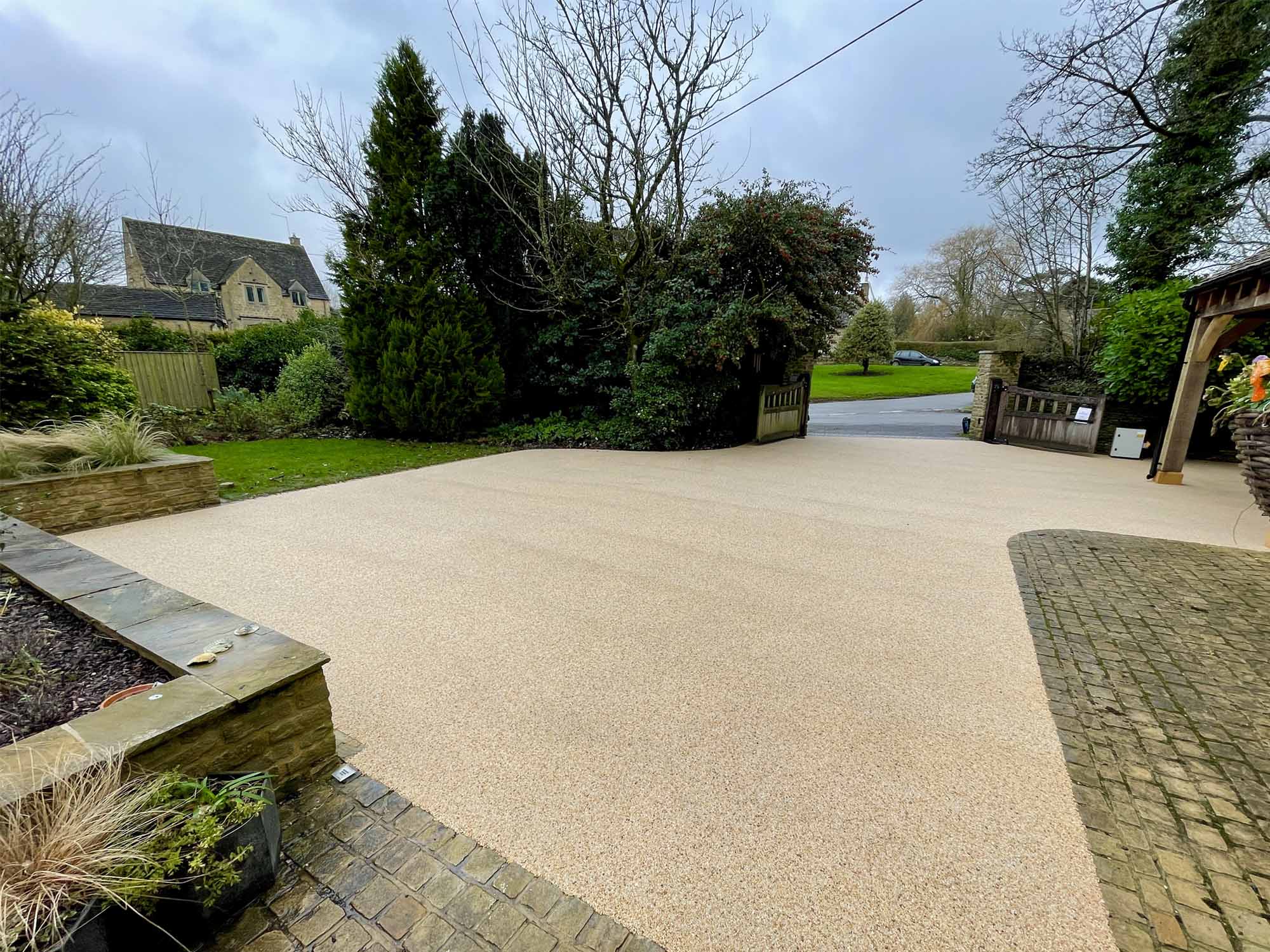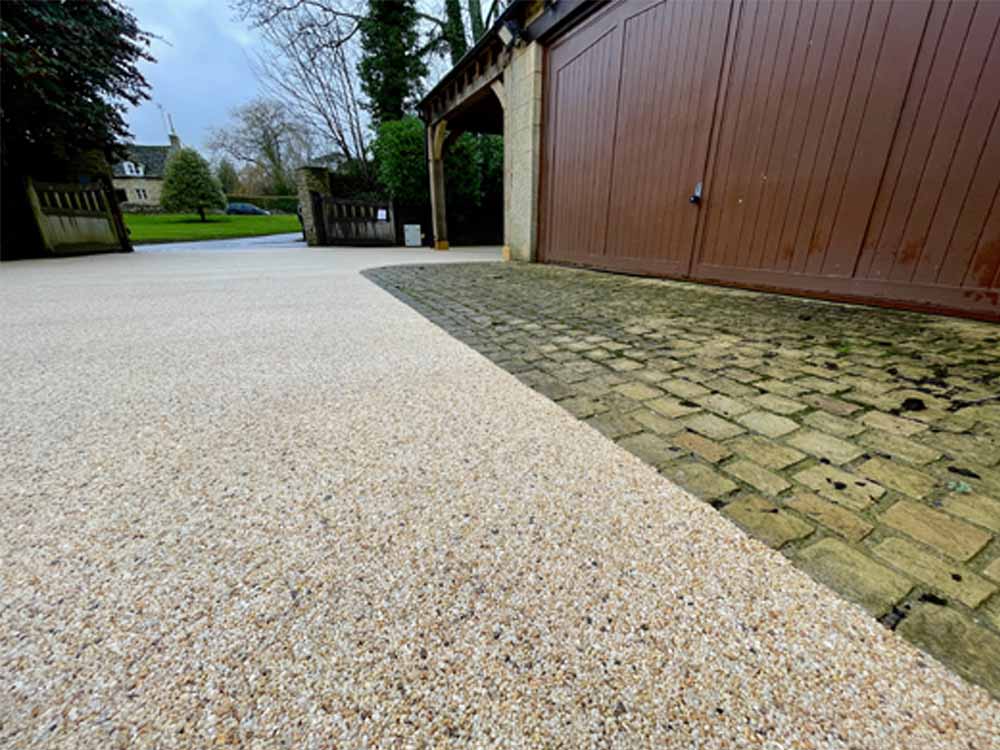
DO I NEED PLANNING PERMISSION FOR A RESIN DRIVEWAY?
Blog
Resin driveways have risen in popularity across the UK as a modern, durable, and aesthetically pleasing driveway surface. Their seamless finish, variety of colours, and low maintenance requirements have made them a sought-after choice for people looking to upgrade their driveways. But do you need permission to install a resin-bound surface?
In this blog, we will examine a resin-bound system, its characteristics, why you would choose it, and whether or not you need planning permission to install it.
What is a resin-bound driveway?
A resin-bound driveway is popular for surfacing driveways, paths, and other outdoor areas. It involves mixing natural aggregates such as loose gravel or crushed loose stones with a clear UV-stable resin to create a smooth, permeable surface.
Why Choose a Resin Driveway?
There are many reasons to choose a resin-bound driveway for your home. Let's look at some of the benefits.
Aesthetically Pleasing:
Resin-bound driveways provide a sleek and modern look that can enhance the overall appearance of your property. The smooth finish and wide range of colours allow customisation to complement your home's style.
Durability and Longevity:
Resin-bound paving and resin-bound systems are durable and can withstand heavy usage without showing signs of wear and tear. They resist cracks, oil stains, UV rays, and harsh weather conditions, ensuring longevity and minimal maintenance requirements.
Low Maintenance:
One of the key benefits of resin-bound driveways is their low-maintenance nature. While a resin driveway cost can be initially higher than a few other options - their maintenance over time is fairly cheap. They are easy to clean with just water and mild detergent, making them a hassle-free option compared to traditional driveway materials.
Permeability:
Resin-bound driveways are permeable, allowing water to drain through the surface. This helps prevent pooling water, reduces the risk of flooding, and contributes to sustainable urban drainage systems (SUDS), making them environmentally friendly.
Safety:
The smooth, anti-slip surface of resin-bound driveways offers excellent traction for both vehicles and pedestrians. This can enhance safety on your property, especially during wet weather conditions.
Versatility:
Resin-bound driveways can be installed over surfaces like concrete or tarmac, reducing the need for extensive groundwork. They can also be creatively designed with patterns, borders, and logos, providing a unique touch to your property.
UV Stable:
High-quality UV-stable resin won't fade or discolour over time due to exposure to sunlight. This ensures that your driveway maintains its colour vibrancy for years to come.
Quick Installation:
Resin-bound driveways offer quick installation times compared to other driveway surfacing options. Once the surface is prepared, the resin and aggregate mixture can be laid relatively quickly, minimising disruption to your daily routine.
So, do you need planning permission for a resin driveway?
In the UK, local authorities have regulations governing the use of impermeable surfaces, such as traditional concrete or asphalt driveways, due to their impact on surface water runoff and drainage systems.
- Planning Regulations: Local planning authorities require homeowners to obtain planning permission to install impermeable driveways exceeding a specific size to address concerns about increased surface water runoff.
- Resin driveways, being permeable surfaces, are often favoured as they allow water to infiltrate through the surface and reduce the strain on drainage systems.
- Permeable vs. Impermeable Surfaces: Using porous surfaces, like resin driveways, aligns with sustainable development principles by promoting natural drainage processes and reducing flood risk. Local authorities may view permeable surfaces more favourably and may have specific guidelines or exemptions for such surfaces regarding planning permission.
- This means that a resin-bound driveway typically will not need planning permission to be installed.
Sustainable Drainage Systems (SuDS) and Permeable Surfaces
Sustainable Drainage Systems (SuDS) are crucial in managing surface water runoff effectively and promoting sustainable development practices. Incorporating porous surfaces, including resin driveways, is encouraged as part of SuDS strategies to mitigate the impact of urban development on drainage systems. Here's an overview of the regulations around SuDS and permeable surfaces:
- SuDS Principles: SuDS aims to mimic natural drainage processes by managing rainfall as close to its source as possible. This includes strategies to reduce surface water runoff, promote infiltration, and enhance water quality. Porous surfaces, like resin driveways, align with SuDS principles by allowing water to filter through the surface and into the ground.
- Regulations and Guidelines: Local authorities may have specific rules and guidelines related to SuDS implementation, particularly in areas prone to flooding or with limited drainage capacity. Using porous surfaces, such as resin driveways, can demonstrate compliance with SuDS requirements and may streamline the planning permission process by contributing to sustainable water management practices.
How do these laws affect resin driveways?
Resin driveways are porous, permeable surfaces, and so they are considered permissible under permitted development rights. This means you can usually install them without seeking planning permission. The key requirement is that the surface allows water to drain through, helping to prevent flooding and manage rainwater effectively.
Drainage Capability:
Resin-bound driveways are designed to allow water to permeate through the surface rather than create runoff. Thishelps prevent surface water pooling, flooding, or erosion, especially during heavy rainfall.
Sustainable Drainage Systems (SuDS):
Due to their permeable nature, resin-bound surfaces are considered SUDS compliant. SuDS aim to manage rainfall more naturally, reducing the risk of flooding and pollution by encouraging water to infiltrate into the ground.
Preventing Surface Water:
The permeability of resin-bound driveways allows rainwater to drain through the surface, reducing the need for additional drainage systems. This can contribute to better water management on residential properties.
Environmentally Friendly:
Resin-bound driveways help replenish groundwater levels and support local ecosystems by allowing water to permeate through the surface. This eco-friendly feature aligns with sustainable landscaping practices and environmental regulations.
Reduced Risk of Puddles:
The permeable nature of resin-bound driveways helps prevent the formation of puddles or standing water on the surface. This enhances safety by reducing slip hazards and maintains the driveway's aesthetic appeal.
Impact on Planning Permission
The size and extent of a driveway can significantly impact the planning permission requirements set forth by local authorities.
- Planning Thresholds: Local planning authorities often set thresholds based on the size and extent of driveways that trigger the need for planning permission. These thresholds vary between different areas and may depend on property type, location, and existing regulations.
- Visual Impact: Larger driveways or those extending closer to public roads or neighbouring properties may have a more significant visual impact on the surrounding area. When evaluating planning permission requirements, local authorities may consider the visual aesthetics and potential impact on the streetscape.
- Traffic Safety: The size of the driveway can also impact traffic flow, visibility, and safety in the vicinity. Too large or obstructive driveways may raise concerns regarding vehicle access, pedestrian safety, and adherence to highway regulations, potentially influencing planning permission decisions.
- Maximum Width and Length: Regulations may specify the maximum allowable width and length of driveways to prevent excessive paving or encroachment onto public spaces. Adhering to these dimensions helps control the visual impact of driveways and maintains a balance between hard landscaping and green spaces.
- Urban vs. Rural Areas: Properties in urban areas with denser populations and limited space may face stricter regulations regarding driveway construction and modifications. In contrast, properties in rural or suburban areas may have more flexibility but still need to comply with local planning policies.
- Conservation Areas: Properties located within conservation areas are subject to stringent planning controls aimed at preserving the area's heritage, architectural character, and environmental quality. Any modifications, including driveway installations, must adhere to conservation guidelines and may require special permissions.
- Listed Buildings: Properties designated as listed buildings are protected due to their historical or architectural significance. Any alterations, including driveway changes, must respect the building's character and may require consent from heritage authorities and standard planning permission.
- Specific Regulations: Certain areas may have unique planning regulations related to landscaping, land use, or environmental protection. Homeowners should be aware of any particular guidelines or restrictions that apply to their location and factor them into their planning permission considerations for driveway projects.
Local Authority Guidelines
When planning any property improvement project, including driveway installations like resin driveways, it is crucial to adhere to local authority guidelines and regulations.
- Compliance: Local authority guidelines outline the rules and regulations that govern property development within a specific area. By complying with these guidelines, homeowners can ensure that their projects meet legal requirements and avoid potential issues or delays.
- Preservation: Many local authorities have guidelines to protect heritage sites, conservation areas, and the environment. Following these guidelines helps preserve the area's character, history, and natural beauty, contributing to sustainable development practices.
- Community Harmony: Adhering to local authority regulations regarding property improvements, such as resin driveway installations, promotes harmony within the community by maintaining consistency in design, landscaping, and overall aesthetics. Respecting neighbourhood standards fosters a cohesive and visually appealing living environment.
- Planning Permission: Understanding local planning requirements is essential for determining whether planning permission is needed for a specific project. By familiarising themselves with the guidelines, homeowners can assess the feasibility of their plans and navigate the planning process effectively.
Final Thoughts
In the UK, installing a resin driveway without any planning permission is generally okay. If you need clarification on your property, please fill out our form below, and a member of our team will contact you as soon as possible. Whether you want to know what your resin bound driveway cost cost would be or to find out if your property falls under mitigating criteria - our team will be able to help.
For more information on planning permission and driveways, please check out our other articles.



